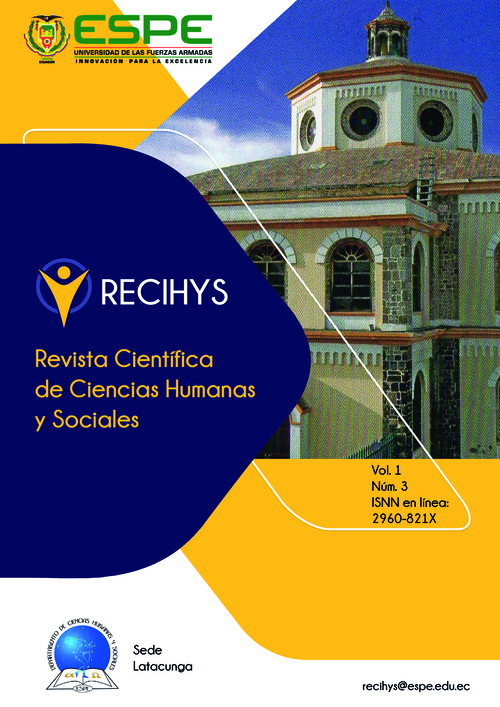The Evolution of the Manager to the Transformative Leader: A Focus on Leadership as a Tool for Integral Development in Organizational Education
Main Article Content
Abstract
The study focused on the transition from the managerial role to a transformative leader, identifying its importance in Comprehensive Development within Organizational Education. Through a descriptive methodology and a documentary analysis, different paradigms of leadership that the modern manager adopts were explored, emphasizing how enhancing the human capital of educational institutions can lead to significant advances. By examining the various theories of leadership and assessing the functions and activities of the manager in public institutions, aspects such as efficiency and effectiveness were highlighted. The results indicated that the manager, by assuming the role of a transformative leader, becomes a crucial factor in driving comprehensive development in the organizational educational field.
Downloads
Article Details

This work is licensed under a Creative Commons Attribution 4.0 International License.
Authors who publish in this journal agree to the following terms: Authors retain the copyright and guarantee the journal the right to be the first publication of the work, as well as, licensed under a Creative Commons Attribution License that allows others share the work with an acknowledgment of the authorship of the work and the initial publication in this journal. Authors may separately establish additional agreements for the non-exclusive distribution of the version of the work published in the journal (for example, placing it in an institutional repository or publishing it in a book), with acknowledgment of its initial publication in this journal. Authors are allowed and encouraged to disseminate their work electronically (for example, in institutional repositories or on their own website) before and during the submission process, as it may lead to productive exchanges as well as further citation earliest and oldest of published works.
How to Cite
References
Arias (2006) Proyecto de Investigación Guía para su Elaboración. Editorial Epísteme
Bass, B y Avolio, B (2006). Manual for the multifactor leadership questionnaire. ConsultingPsychologistPress. Palo Alto. California.
Bass, B. M. (1990). Bass & Stogdill's Handbook of Leadership: Theory, Research, and Managerial Applications. Free Press
Bonifaz, C (2012). Liderazgo Empresarial. (Primera Edición). México. Editores Red Tercer Milenio S.C.
Crosby, P. (2003). Liderazgo, el arte de convertirse en un buen gerente, Editorial McGraw Hill.
Drucker, P. (2006). La Gerencia en la Sociedad Futura. Colombia: Grupo Editorial Norma.
Drucker, P. F. (2001). Management Challenges for the 21st Century. HarperCollins.
Garzón, S y Marín, D (2013), Caracterización del estilo de liderazgo y la percepción de sus colaboradores (Caso Aguas de Manizales) http://ridum.umanizales.edu.co:8080/xmlui/handle/6789/1114[Consulta: 2017, Octubre 21]
Giraldo, D y Naranjo, J (2014), Liderazgo: Desarrollo del Concepto, Evolución y Tendencias http://repository.urosario.edu.co/bitstream/handle/10336/8672/1026275656-2014.pdf[Consulta: 2017, Octubre 21]
González, R. (2019). The Contemporary Leader: A Multidimensional Approach. Leadership Today, 21(4), 219-228.
Hernández, R., Fernández, C., Baptista, P. (2006). Metodología de la investigación. México: McGraw-Hill
Johnson, L. (2020). Transforming Leadership in Education: Building Empathy and Collaboration in Schools. International Journal of Educational Leadership and Management, 15(3), 98-112.
Kotter, J. P. (1996). Leading Change. Harvard Business Review Press.
La Ley Orgánica del trabajo, los trabajadores y las trabajadoras. Gaceta Oficial N° 6.076 Extraordinario del 7 de mayo de 2012.
Mintzberg, H. (1994). The Rise and Fall of Strategic Planning. The Free Press.
Northouse, P. G. (2018). Leadership: Theory and Practice. Sage Publications.
Palella S., y Martíns F. (2006). Metodología de la investigación cuantitativa. Fondo Editorial Universidad Pedagógica Experimental Libertador.
Pérez, A. (2002). Guía Metodológica para Anteproyectos de Investigación. Caracas: FEDEUPEL.
Porter, M. E. (1985). Competitive Advantage: Creating and Sustaining Superior Performance. The Free Press.
Ramírez, T. (2002). Cómo hacer un Proyecto de Investigación. Caracas: Editorial Carhel, C. A.
Robbins, S. (2000) Administración. Prentice Hall Hispanoamérica S.A
Robbins, S. y Judge, T. (2009) Comportamiento organizacional. Decimotercera Edición.
Sallenave, J.P. (2003). La Gerencia Integral. Editorial Norma. Colombia
Smith, J. (2021). Transactional Leadership in Education: A Study on Motivation and Performance in Schools and Universities. Journal of Educational Leadership, 27(2), 48-62.

